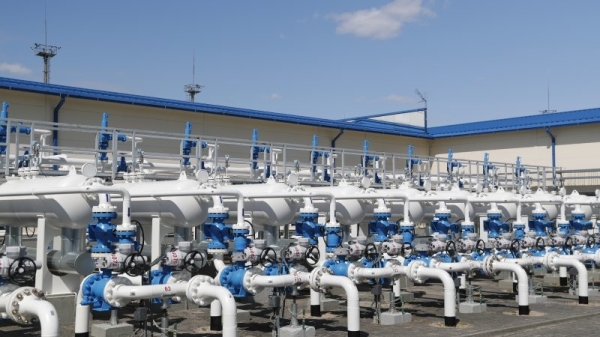Over 90% of Germany’s gas grid could be redundant by 2045, think-tank says

As Germany transitions away from fossil fuels to achieve climate neutrality by 2035, Berlin-based think-tank Agora Energiewende estimates that between 71 to 94% of the existing gas grid may become redundant.
Few countries embraced fossil gas as strongly as Germany did. Not only do 20 million households rely on the gaseous fuels for heating, it fuels its world-leading chemical industry.
In all, Germany’s gas grid boasts a length of more than 500,000 kilometres – enough to go around the world more than 12 times.
But as Germany starts to shift away from gas, this fine network of underground pipelines may soon become obsolete.
“The farewell to natural gas and the switch to green district heating and heat pumps place new demands on the energy grid,” said Simon Müller, Germany chief at Agora Energiewende, who was the lead author on the study released on Tuesday (18 April).
“Switch to climate-neutral energy makes most of the gas distribution networks redundant,” the think-tank added in a statement.
By 2045, Germany aims to be climate-neutral. As such, households are looking to switch from gas to cleaner sources of heating and industry seeking to use hydrogen and its derivatives instead.
Citing an array of leading German climate studies, the think-tank notes that by 2045, demand for gas – fossil and bio – will drop by 85% to 97%. Meanwhile, demand for hydrogen is expected to come in at 266 Terawatt-hours – 30% of energetic demand for fossil gas today.
Should network operators fail to plan ahead, the think-tank warns of €10 billion of stranded assets without a purpose and significant added costs to consumers – who would be forced to bear the stranded assets’ costs through up to 16 times higher grid fees.
Fight for the future
Germany is in the midst of a political fight over the future of gas networks, whose operators say they are a valuable asset and could easily be repurposed to transport hydrogen instead.
Gas and water grid association DGVW contends that 98% of Germany’s gas grid could accommodate hydrogen. Dismantling the grid would destroy an infrastructure “worth several hundred billion euros,” industry lobby chief Gerald Linke, head of DGVW, told Welt am Sonntag in 2022.
Experts have questioned this claim, given that hydrogen is much more prone to leaking than fossil gas – given its relatively much smaller molecule size – requiring a total revamp of valves and associated grid equipment.
Further, Agora Energiewende estimates the gas grid’s value at 20% of total investment, coming out to €60 billion. And due to the high earnings of gas companies, most of that investment already paid out.
“The majority of the network investments have already been refinanced despite the long depreciation period of around 45 years, so that the residual value in relation to the new value is manageable,” says Müller. Just in 2021, grid operators invested a record sum of €1.1 billion.



